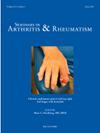Assessment of triple antiphospholipid antibody-positive patients based on clinical and laboratory domains of 2023 ACR/EULAR antiphospholipid syndrome classification criteria
IF 4.4
2区 医学
Q1 RHEUMATOLOGY
引用次数: 0
Abstract
Objectives
Triple aPL-positive patients (positive for lupus anticoagulant [LA], anticardiolipin antibody [aCL], and anti-β2-glycoprotein-I antibody [aβ2GPI]) are at higher risk for severe clinical manifestations compared to double or single aPL-positive patients. This study aimed to evaluate the characteristics of triple aPL-positive patients using the 2023 ACR/EULAR Antiphospholipid Syndrome (APS) Classification Criteria (CC) and compare those with different aCL/aβ2GPI isotypes.
Methods
We retrospectively analyzed an APS-specialized practice cohort (Feb 2016–May 2024). Triple aPL positivity was defined as persistently positive LA, aCL IgG/M ≥ 40 ELISA Units, and aβ2GPI IgG/M ≥ 40 ELISA Units. Demographic, clinical, and serologic features were assessed, and patients with aCL/aβ2GPI IgG (±IgM) were compared to those with IgM-only.
Results
Among 751 patients, 193 had confirmed persistent triple aPL positivity (165 IgG [±IgM], 28 IgM-only). Clinical domain involvement included macrovascular venous thromboembolism (46 %), macrovascular arterial thrombosis (39 %), microvascular (35 %), obstetric (46 %), cardiac valve (16 %), and hematologic (34 %). Patients with aCL/aβ2GPI IgG (±IgM) had significantly higher 2023 ACR/EULAR CC total clinical domain score, greater involvement of macrovascular and microvascular domains, and higher use of long-term anticoagulation, steroids, and immunosuppression compared to IgM-only patients. Notably, almost half of IgM-only patients, who were older, lacked clinical domain involvement.
Conclusions
Our findings highlight distinct clinical profiles in triple aPL-positive patients based on aCL/aβ2GPI isotypes. While IgG (±IgM) isotypes were associated with higher clinical domain scores and severe manifestations, the role of IgM-only isotypes warrants further mechanistic and clinical investigation even in triple aPL profile.
基于2023年ACR/EULAR抗磷脂综合征分类标准临床和实验室领域对三重抗磷脂抗体阳性患者的评估
目的三重apl阳性患者(狼疮抗凝剂[LA]、抗心磷脂抗体[aCL]、抗β2-糖蛋白- 1抗体[a -β 2gpi]阳性)发生严重临床表现的风险高于双重或单一apl阳性患者。本研究旨在采用2023 ACR/EULAR抗磷脂综合征(APS)分类标准(CC)评估三型apl阳性患者的特征,并比较不同aCL/a - β 2gpi亚型。方法回顾性分析2016年2月- 2024年5月aps专业执业队列。三重aPL阳性定义为LA持续阳性,aCL IgG/M≥40 ELISA Units, aβ2GPI IgG/M≥40 ELISA Units。评估了人口统计学、临床和血清学特征,并将aCL/a - β 2gpi IgG(±IgM)患者与仅IgM患者进行比较。结果751例患者中,有193例确诊为持续三重aPL阳性(IgG[±IgM] 165例,IgM阳性28例)。临床涉及的领域包括大血管静脉血栓栓塞(46%)、大血管动脉血栓形成(39%)、微血管血栓(35%)、产科(46%)、心脏瓣膜(16%)和血液学(34%)。与仅IgM患者相比,aCL/a - β 2gpi IgG(±IgM)患者的2023 ACR/EULAR CC总临床域评分明显更高,大血管和微血管域更受侵犯,长期抗凝、类固醇和免疫抑制的使用更高。值得注意的是,几乎一半的igm患者,年龄较大,缺乏临床领域介入。结论基于aCL/a - β 2gpi亚型,sour研究结果突出了三重apl阳性患者的不同临床特征。虽然IgG(±IgM)同型型与较高的临床结构域评分和严重的表现相关,但IgM-纯同型型的作用需要进一步的机制和临床研究,即使在三重aPL谱中也是如此。
本文章由计算机程序翻译,如有差异,请以英文原文为准。
求助全文
约1分钟内获得全文
求助全文
来源期刊
CiteScore
9.20
自引率
4.00%
发文量
176
审稿时长
46 days
期刊介绍:
Seminars in Arthritis and Rheumatism provides access to the highest-quality clinical, therapeutic and translational research about arthritis, rheumatology and musculoskeletal disorders that affect the joints and connective tissue. Each bimonthly issue includes articles giving you the latest diagnostic criteria, consensus statements, systematic reviews and meta-analyses as well as clinical and translational research studies. Read this journal for the latest groundbreaking research and to gain insights from scientists and clinicians on the management and treatment of musculoskeletal and autoimmune rheumatologic diseases. The journal is of interest to rheumatologists, orthopedic surgeons, internal medicine physicians, immunologists and specialists in bone and mineral metabolism.

 求助内容:
求助内容: 应助结果提醒方式:
应助结果提醒方式:


